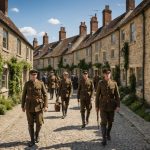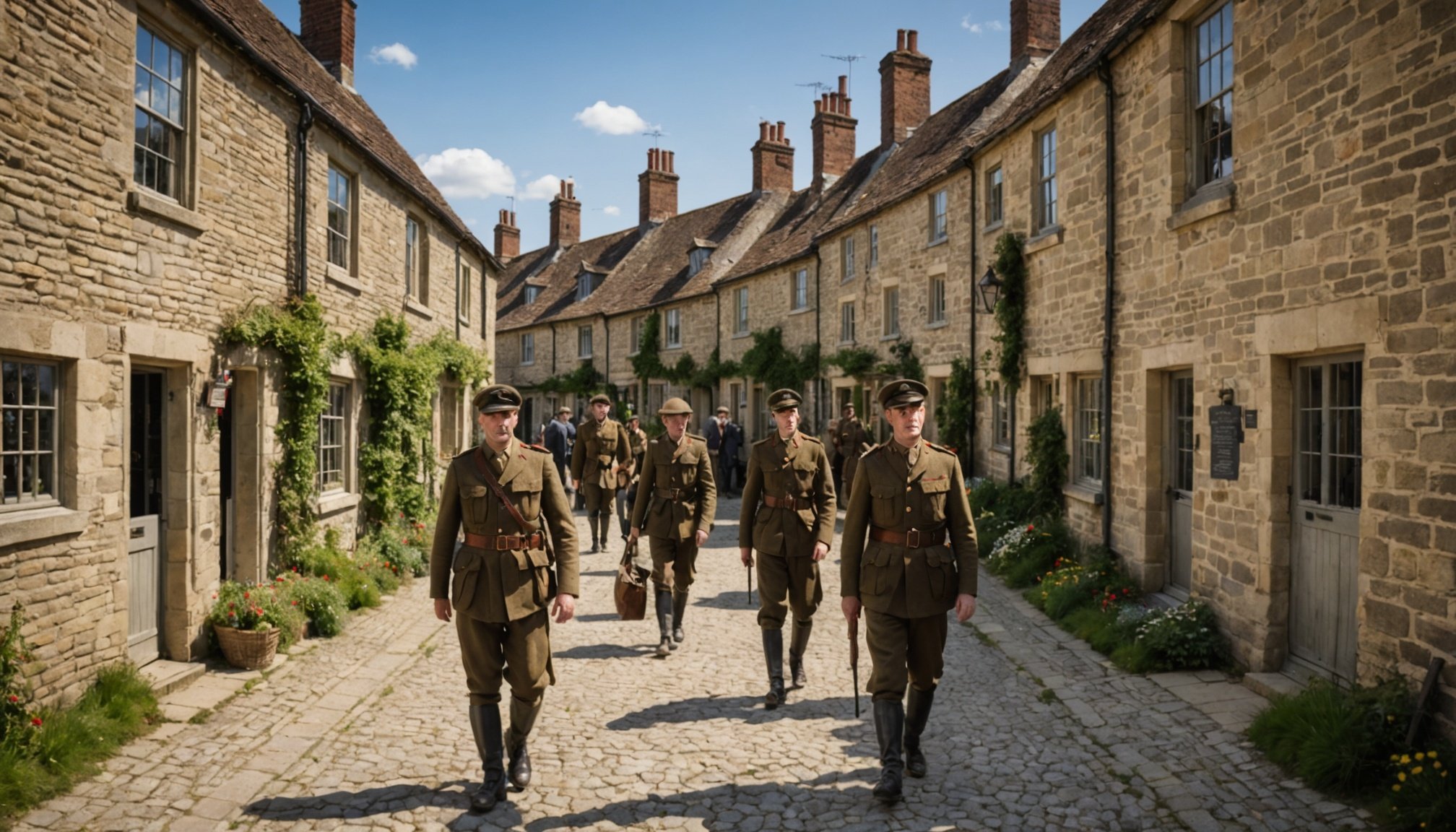World War I profoundly shaped rural English villages, leaving behind both scars and resilience. Engaging guided tours reveal not just the historical sites, but the stories of the people who lived through those challenging times. Discover how war transformed village life, influenced local culture, and forged unbreakable community bonds. Experience the past while appreciating the enduring legacy creators and survivors left in their wake. Join us to explore this unique perspective and connect with history that still resonates today.
Historical Overview of World War I's Impact on Rural English Villages
World War I, a significant chapter in English history, left an indelible mark on rural English villages. The war's historical impact was profound, altering the fabric of these communities in numerous ways. During the conflict, many young men from rural areas enlisted, leading to noticeable demographic shifts. This not only affected the population numbers but also the age and gender balance, with a lasting effect on village life.
This might interest you : How can tourists find interactive experiences focusing on the history of the British railway system?
The societal changes were vast. With the men away at war, women in rural villages had to take on new roles, often working in agriculture or other traditionally male-dominated jobs. This shift led to a gradual change in gender roles and expectations, which persisted even after the war ended. The absence of a significant portion of the male population also meant that many villages experienced labour shortages, impacting local economies.
Long-term effects included changes in land use and farming practices, as well as shifts in social structures and community dynamics. The war catalysed movements towards modernisation and mechanisation in agriculture, which further transformed rural economies. These changes, although challenging, paved the way for a new era in rural English life, forever altering the landscape of these villages.
Also read : Discover British Naval Battle History: Engaging Guided Tours in Portsmouth
Key Villages Affected by World War I
World War I left a profound impact on several notable villages in rural England, reshaping their infrastructure and community dynamics. Villages such as Ypres, Somme, and Passchendaele became historically significant due to their strategic roles during the war. These areas witnessed dramatic changes, both during and after the conflict.
Infrastructure and Community Changes
The war necessitated the construction of new roads and railways to support military logistics. This development altered the traditional layouts of these affected villages, leading to a shift in community structure. The influx of military personnel and equipment often resulted in the repurposing of local buildings, sometimes permanently changing their functions.
Preservation of War Memorials
War memorials in these villages serve as poignant reminders of the conflict's impact. They are crucial in preserving local history and honouring those who served. These memorials, often situated in village squares or near churches, have become integral to the cultural identity of these communities. They not only commemorate the past but also educate future generations about the historical significance of World War I and its enduring legacy in rural England.
Guided Tours Exploring World War I History
Embarking on guided tours offers a unique opportunity to delve into the historical impacts of World War I on rural English villages. These tours are designed for those interested in educational travel, providing rich insights into the war's legacy.
Overview of Available Tours
Numerous historical tours are available, each offering a distinct perspective on World War I's influence. These tours often include visits to significant battlefields, war memorials, and villages that played pivotal roles during the conflict. Participants can explore locations like Ypres and Somme, gaining a deeper understanding of the war's historical context.
Unique Features of Each Tour
Each tour boasts unique features, such as local guides who offer immersive experiences with first-hand knowledge of the area's history. Some tours provide interactive elements, like reenactments or access to private collections of wartime memorabilia. These features ensure a comprehensive and engaging exploration of World War I history.
Tour Operators and Their Expertise
Choosing the right tour operator enhances the educational travel experience. Reputable operators are often staffed by historians and experts passionate about sharing their knowledge. They curate tours with attention to detail, ensuring participants receive an informative and memorable journey through the historical landscapes of rural England.
Educational Benefits of Participating in Guided Tours
Engaging in guided tours offers significant educational benefits, particularly in the realm of historical education. These tours provide an unparalleled opportunity for immersive learning, allowing participants to experience history beyond textbooks.
Importance of Experiential Learning
Experiential learning is crucial in understanding complex historical events. By visiting actual sites where history unfolded, participants gain a tangible connection to the past. This method of learning is particularly effective in enhancing knowledge retention, as it stimulates multiple senses and encourages active participation.
How Guided Tours Enhance Engagement
Guided tours are designed to be engaging and informative. They often include storytelling, interactive activities, and access to exclusive locations, which make the learning process more dynamic. Participants report that these elements significantly enhance their understanding and appreciation of historical events.
Testimonials from Previous Participants
Many past participants have shared positive experiences, noting the profound impact these tours have had on their understanding of history. They often highlight the value of learning from knowledgeable guides who provide insights that are not available through conventional educational methods. Such testimonials underscore the transformative power of guided tours in fostering a deeper connection to historical events and their lasting legacies.
Practical Information for Tour Participants
Understanding the tour logistics is crucial for a seamless experience. Tours generally vary in duration, ranging from half-day excursions to multi-day adventures. Itineraries are meticulously planned, offering a balance of historical exploration and leisure. Group sizes are typically small to ensure a more personalised experience, allowing participants to engage deeply with the content.
When considering the cost information, it's essential to note that prices can fluctuate based on the tour's length and inclusivity. Some operators offer comprehensive packages covering accommodation, meals, and entrance fees, while others provide more flexible options. Discounts may be available for early bookings or group reservations, making these tours accessible to a broader audience.
Planning your visit involves several key considerations. The best times to tour are often during the spring and autumn months when the weather is mild, and the landscapes are picturesque. Accommodations range from quaint bed-and-breakfasts to more luxurious hotels, catering to various preferences and budgets. It's advisable to book accommodations in advance, especially during peak seasons, to ensure availability and the best rates. By carefully planning these aspects, participants can maximise their enjoyment and educational experience during their historical journey.
Additional Resources and Further Reading
For those interested in delving deeper into the historical resources of World War I's impact on rural English villages, a wealth of further reading and research materials is available. These resources offer comprehensive insights and context beyond the guided tours.
Recommended Books, Articles, and Documentaries
A selection of recommended books provides detailed accounts of the war's effects on rural England. Notable titles include "The Great War and Rural England" by Alun Howkins and "Rural Britain: Then and Now" by Richard Muir. These works explore the socio-economic changes and the transformation of village life during and after the war. Additionally, documentaries such as "World War I: The Rural Impact" offer visual narratives that highlight these historical shifts.
Online Resources and Local Historical Societies
For those seeking online resources, websites like the Imperial War Museums offer extensive archives and interactive maps detailing village histories. Local historical societies, such as the Rural History Centre, provide valuable contact information for further exploration. These societies often host events and maintain collections that are invaluable for researchers and enthusiasts alike.
Museums and Additional Exploration
Visiting local museums dedicated to World War I history can further enrich your understanding. Many offer exhibits specifically focused on rural communities, showcasing artifacts and personal stories that bring history to life.
















